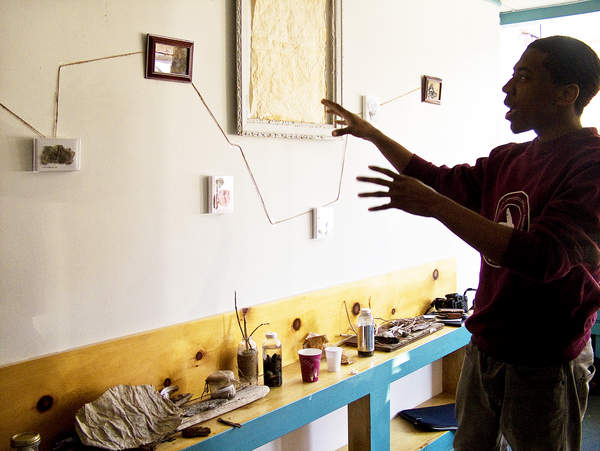Muck Monster Project
Posted by: Loren Coleman on March 24th, 2011


Stephen Edmond gives a tour of some artifacts relating to a supposed serpent living the Kirby Lake, a.k.a. The Muck (pictured below). The exhibition was the culmination of a week-long session of Project M, a camp for young designers that periodically takes up residence in Belfast, and drawing inspiration from the city. (Photos by: Ethan Andrews)

Once before, at Cryptomundo, the Muck Monster was discussed, in 2007, here.
This is the latest.
Breaking news from Belfast, Maine, via an article by Ethan Andrews:
Have you heard the legend about the serpentine monster that lives in The Muck in Belfast? If not, you’re probably not alone. But if the idea seems intriguing, read on.
A group of students from the Maryland Institute College of Art participating in a weeklong session of Project M — a camp that challenges young designers to immerse themselves in the local community and create socially relevant art in short order — found some mentions of the serpent while researching Belfast folklore when they first arrived in the city, and set out to see if the story had teeth and to do something good with it in the process.
Among local residents interviewed by the group, some had heard of the rumored serpent; many hadn’t. But everyone seemed to have a story about The Muck that involved a mystery.
The muddy pond between Miller Street and Lincolnville Avenue, best known for unpredictable ice skating conditions, was rumored to be of unknown depth — 1,000 feet, someone said. Another resident thought there was an elephant that had drowned in the pond. Numerous cars are known to have gone into the drink over the years, and only some of these have been recovered.
One resident claimed to have seen the serpent on two occasions but may have been drunk at the time, group members said.
“All of these stories started sprouting up,” said Project M participant Stephen Edmond. “When we heard about The Muck, we imagined this ocean-width body of water, and found that it was just this little frozen pond.”
A little frozen pond with a lot of stories.
The interviews also revealed a split between younger residents, who felt like there was nothing to do in Belfast, and older residents who cherish peace and quiet. Among Project M participants, the hope was to shake things up, but in a way that would be appealing to everyone.
The students researched the mythology of serpents in Penobscot Bay and found legends that could arguably be applied to The Muck dating back centuries, from settlers and in the folklore of the Penobscot tribe. During the course of a week, they assembled a show of recreated artifacts relating to the Muck monster myth, using distressed paper to make plausible-looking samples of the monster’s skin, recreating drawings of Penobscot encounters with the serpent, and including the requisite grainy and blurred photographs of what might be the head and neck of the serpent emerging from the water.
On Friday, March 18, Edmonds and four others from the group were busy hanging the artifacts on the walls of an empty downtown storefront, in preparation for a one-night-only show that evening dedicated to the monster, for whom the group appeared to have developed a charitable fondness, giving him the approachable name “Melvin.”
“We feel like he’s gotten a bad rap,” Edmonds said, recounting a Penobscot story of a woman who was supposedly eaten by the monster.
“We don’t think Melvin would have done something like that. We think maybe he was so excited to have some company and he tried to give her a kiss or something,” he said.
Another Project M participant, Colin Dunn, was standing nearby and he summed up the plight of the ancient monster in modern terms.
“He’s misunderstood,” he said.
The two were looking at a drawing resembling a compass rose that Edmonds said was a reproduction of a Penobscot image. Edmonds and Dunn gave a deadpan explanation of the piece, which was affixed to the top of wooden disc — a hockey puck, as it turned out. It was a ruse, but a sly one that made a facsimile of an old artifact from modern day one, likely found by the students at the pond. Whether people believe it or not wasn’t the point.
“We wanted a forum in the community where we could get younger kids talking to stakeholders,” he said. “Maybe we can bring people into the same space to talk about something interesting.”
Edmonds said he was impressed with the humor and kindness of people in Belfast but was aware that the group could easily come off as interlopers.
“I think people will realize we’re not making fun of the town,” he said. “And that they will be excited that we’re doing something interesting in the community — that we’re latching onto this legend and getting really artistic with it.” Belfast Republican Journal ~ Village Soup ~ March 24, 2011

About Loren Coleman
Loren Coleman is one of the world’s leading cryptozoologists, some say “the” leading living cryptozoologist. Certainly, he is acknowledged as the current living American researcher and writer who has most popularized cryptozoology in the late 20th and early 21st centuries.
Starting his fieldwork and investigations in 1960, after traveling and trekking extensively in pursuit of cryptozoological mysteries, Coleman began writing to share his experiences in 1969. An honorary member of Ivan T. Sanderson’s Society for the Investigation of the Unexplained in the 1970s, Coleman has been bestowed with similar honorary memberships of the North Idaho College Cryptozoology Club in 1983, and in subsequent years, that of the British Columbia Scientific Cryptozoology Club, CryptoSafari International, and other international organizations. He was also a Life Member and Benefactor of the International Society of Cryptozoology (now-defunct).
Loren Coleman’s daily blog, as a member of the Cryptomundo Team, served as an ongoing avenue of communication for the ever-growing body of cryptozoo news from 2005 through 2013. He returned as an infrequent contributor beginning Halloween week of 2015.
Coleman is the founder in 2003, and current director of the International Cryptozoology Museum in Portland, Maine.









